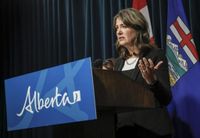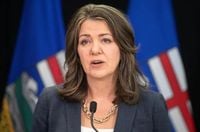Alberta Premier Danielle Smith has stirred significant conversation regarding the province's potential separation from Canada. During a press conference held on May 6, 2025, Smith announced that if citizens gather enough signatures for a petition, a referendum on Alberta's separation could be held in 2026. While she respects the results of any such referendum, she emphasized that she does not support the initiative itself.
Smith expressed her commitment to addressing the grievances that many Albertans feel towards the federal government, which she claims has caused disruptions over the past decade. She stated, "I want Canada to be strong and united, and for the jurisdiction of provinces to be respected, and that’s what I will work on.” Her comments came in response to rising support for the idea of Alberta separating from Canada, with a recent Nanos Research poll indicating that around 30 percent of Albertans believe the province should either become an independent country or join the United States.
In her efforts to manage the growing separatist sentiment, Smith's government has introduced legislation aimed at reducing the threshold required for a referendum. If passed, the proposed bill would lower the petition requirement from 20 percent of registered voters to just 10 percent of the electorate from the last general election. Additionally, petitioners would have 120 days instead of the current 90 to gather the necessary 177,000 signatures needed to trigger a voting date.
Despite the changes, Smith clarified that her government does not intend to put the issue of separation to a vote without a citizen-led petition. "I do not want to assume that a referendum will necessarily take place," she remarked, reiterating her respect for the electoral process. Nonetheless, she acknowledged the persistent feelings of resentment towards Ottawa that have been exacerbated in recent years, stating, "This sentiment has always been present in Alberta's political landscape, and it has now intensified.”
Smith's approach to the issue reflects her broader strategy of reducing tensions surrounding Alberta's autonomy. She articulated her desire to ensure that citizens feel heard and respected, emphasizing the importance of allowing discussions about their concerns to take place in a respectful manner. "People have the right to express their opinions on issues that matter to them, and I believe my job is to ensure these debates occur respectfully,” she said.
Additionally, Smith announced plans to establish a commission focused on sovereignty issues, tasked with exploring long-term options for Alberta's economic and constitutional protection from the federal government. This panel, dubbed "Alberta Next," will conduct public hearings to gather opinions from Albertans. Following these discussions, residents will have the opportunity to vote on the most popular proposals next year.
However, not all voices in Alberta are in agreement with Smith's approach. Leaders of the First Nations of Alberta, particularly those under Treaties 6, 7, and 8, have voiced their concerns regarding the legislative changes proposed in Bill 54. They argue that the Alberta government must respect its agreements with the Crown and should not interfere with their rights. Chief Troy Naulton of the Piikani Nation stated, "This is treaty land. Any talk of separation is just nonsense because there is no path to separation.”
In her press conference, Smith also touched on her recent interactions with federal leaders, including Premier Mark Carney's trip to Washington, which she described as "successful." She indicated that fostering a strong relationship with the federal government is essential for Alberta's future. Smith reiterated her hope for a strong and sovereign Alberta within a united Canada, stating, "I still have hope that there is a way forward for a strong and sovereign Alberta within a united Canada. Therefore, I will do everything in my power to negotiate a fair deal for Alberta with the new Prime Minister.”
As the conversation around Alberta's separation continues to gain momentum, it remains to be seen how Smith's government will navigate the growing divide between those advocating for independence and those who wish to maintain the province's ties to Canada. While the proposed legislative changes may facilitate a path towards a referendum, the complexities surrounding the issue, including First Nations rights and the potential ramifications of separation, will undoubtedly play a significant role in shaping the future discussions.
Smith's administration is now faced with the challenge of balancing the desires of a segment of the population that seeks greater autonomy with the need to respect existing treaties and agreements. As she stated, "Let’s not demonize people. Let’s recognize that feelings have roots, and the root is how the Liberals have treated Alberta over the last ten years. And I sincerely mean that.”
The issue of Alberta's potential separation is not just a political debate; it reflects deeper sentiments of frustration and desire for recognition that have simmered beneath the surface for years. As the landscape evolves, the coming months will be critical in determining how Albertans choose to express their voices and what direction their province will ultimately take.






